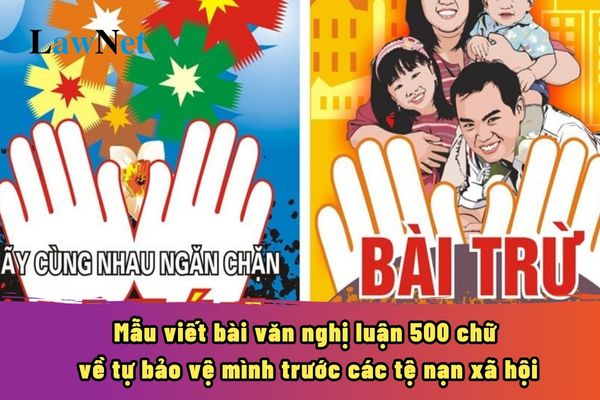What are the sample 500-word argumentative essays on self-protection against social evils in Vietnam? What are the objectives of Literature curricula across three education levels?
What are the sample 500-word argumentative essays on self-protection against social evils in Vietnam?
8th-grade students can refer to the following sample 500-word argumentative essays on self-protection against social evils in Vietnam:
|
Sample 500-word argumentative essays on self-protection against social evils Sample 1 |
*Note: The information is for reference purposes only./.

What are the sample 500-word argumentative essays on self-protection against social evils in Vietnam? What are the objectives of Literature curricula across three education levels? (Image from Internet)
What are the general objectives of the 8th-grade Literature curriculum in Vietnam?
According to Section 3 of the Appendix to the General Education Program for Literature issued together with Circular 32/2018/TT-BGDDT on the objectives for each educational level, the objectives of Literature curricula at the lower secondary level are as follows:
- General objectives
+ To form and develop in students the essential traits of patriotism, compassion, diligence, honesty, and responsibility; to nurture the soul, shape character, and develop individuality.
The subject of Literature helps students discover themselves and the world around them, understand humanity, have a rich spiritual life, and have humane life perspectives and behaviors; foster a love for the Vietnamese language and literature; cultivate an awareness of national roots and identity, contributing to the preservation and development of Vietnamese cultural values; to cultivate a spirit of embracing international cultural quintessence and an ability to integrate globally.
+ To contribute to helping students develop general competencies: self-control and self-learning, communication and cooperation, problem-solving, and creativity.
Specifically, Literature helps students develop linguistic and literary competencies: training skills in reading, writing, speaking, and listening; acquiring foundational general knowledge of Vietnamese and literature, developing figurative and logical thinking, contributing to forming the basic academic background of a cultured individual; being able to create various types of common texts; being able to comprehend and evaluate literary works in particular, communication products, and aesthetic values in general in life.
What are the objectives of Literature curricula across the three educational levels in Vietnam?
According to sub-section 2 of section 3 of the Appendix to the General Education Program for Literature issued together with Circular 32/2018/TT-BGDDT on the objectives for each educational level, specific objectives of Literature curricula across the three educational levels in Vietnam are as follows:
[1] Primary education
- To help students develop and shape core virtues with specific expressions: love for nature, family, and homeland; consciousness of heritage; appreciation for beauty and goodness, and maintain a healthy emotional state; demonstrate enthusiasm for learning, delight in labor; honesty and integrity in learning and life; consciousness of responsibilities toward themselves, family, society, and the surrounding environment.
- To help students initially form general abilities, develop language proficiency in all skills such as reading, writing, speaking, and listening at a foundational level: reading correctly and fluently; understanding content and main information in texts; making connections and comparisons externally; writing correctly regarding spelling and grammar; composing sentences, paragraphs, and short essays (mainly narratives and descriptions); articulating clearly; understanding spoken ideas.
Develop literary skills by distinguishing poetry from stories, knowing how to read both; recognizing the beauty of artistic language; imagining, understanding, and being moved by the beauty, and goodness of humanity and the world as portrayed in literary works.
[2] Lower secondary education
- To assist students in further developing the virtues shaped during primary education; heightening and broadening the objectives for developmental virtues with specific manifestations such as national pride in history and literature; nurturing dreams and aspirations, fostering self-learning and self-esteem, civic consciousness, and respect for the law.
- Continuously develop the general abilities, language proficiency, and literary skills established during primary education, but with higher demanding standards.
Develop language proficiency with requirements for distinguishing literary texts from argumentative and informational texts; understanding explicit and implicit content within various texts; writing coherent narrative, descriptive, expressive, argumentative, explanatory, journalistic essays, combining diverse expressive methods logically and correctly; speaking clearly and coherently; demonstrating confidence and situation-appropriate attitudes in communication; understanding through attentive listening.
Develop literary abilities by identifying different literary genres like stories, poetry, scripts, and specific sub-genres; recognizing and analyzing the effects of stylistic and artistic elements within each genre; recognizing expressive, cognitive, and aesthetic values; analyzing figurative meanings, content, and form within literary works; creating literary-like products.
[3] Upper secondary education
- To continue developing virtues nurtured during lower secondary education; expand and enhance virtue development requirements with specific expressions: possess resilience, individuality, ideals, and ambitions, understand and promote Vietnam's cultural values; foster a spirit of integration and a global citizen mindset.
- Further develop previously established competencies at the lower secondary level, raising the requirements: understanding both explicit and implicit content in various texts at increasingly challenging levels demonstrated through content and reading requirements; promoting critical thinking in reading comprehension; applying knowledge about literary linguistic characteristics, literary movements, author styles, internal and external textual elements for developing independent reading skills.
Proficiently write composite argumentative and explanatory texts (integrating diverse expressive methods and argumentative approaches), correctly, with personal perspectives ensuring logical coherence and persuasiveness.
Speak and listen flexibly, capable of understanding and evaluating the content and expressive form of presentations; partaking with personal perspectives, individuality, and appropriate argumentative attitudes in discussions.
Develop literary capabilities with requirements for distinguishing literary works from other artistic creations; analyzing and commenting on features of literary language; differentiating between what is expressed and what is expressed in literature; perceiving and analyzing literary works based on stylistic features; having a vivid imagination, being able to appreciate, and evaluate literature; and creating literary-like products.

